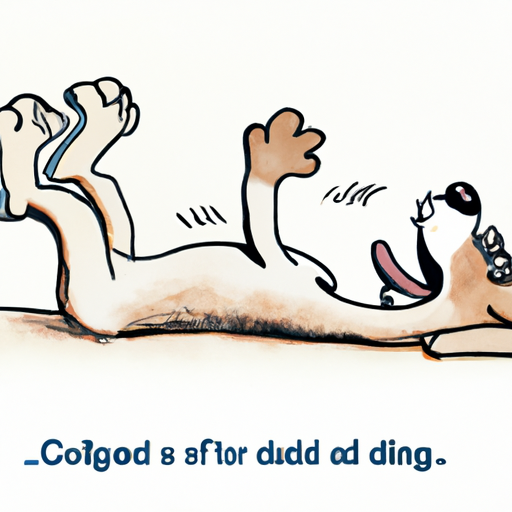In your daily routine of petting your beloved furry friend, you may have noticed a peculiar phenomenon. Your dog starts to kick when you hit a certain spot, almost like they’re trying to shake off an invisible bug. This behavior, known as the “scratch reflex,” is not only fascinating but also offers valuable insights into your dog’s health and well-being.
Table of Contents
- Unraveling the Mystery: The Scratch Reflex
- The Science Behind the Kick: Neurological Responses
- Not Just Fun: The Protective Role
- Exception to the Rule: When Kicking Becomes a Concern
- FAQs
Key Takeaways
- Dogs kick when petted due to a neurological response known as the scratch reflex.
- The scratch reflex serves a protective role, helping dogs to react to irritants on their skin.
- Observing this kicking behavior can provide insights into your dog’s health and well-being.
Unraveling the Mystery: The Scratch Reflex
Imagine you’re scratching your dog’s belly, and they begin to kick their leg. This kicking is not a sign of discomfort or a plea for you to stop. Instead, it’s a common reflex known as the scratch reflex. More often than not, this kicking is accompanied by a blissful expression on your dog’s face, showing that they are indeed enjoying the petting session. This phenomenon, also known as the “thumper leg” or “drumstick phenomenon,” is a source of amusement for many dog owners. However, did you know that there’s an intriguing science behind this behavior?
This article by the American Kennel Club offers detailed insights into the scratch reflex.
The Science Behind the Kick: Neurological Responses
When you pet your dog in certain spots, especially around the belly or the flank area, it triggers a specific set of nerves. These nerves, in turn, send a message to your dog’s spinal cord, which responds with a signal to kick their leg. This reflex is an automatic response, meaning that your dog doesn’t consciously decide to do it. It’s akin to how our knee jerks when the doctor taps it with a reflex hammer.
In a nutshell, the kicking motion is your dog’s natural response to being ‘tickled’ in sensitive areas. Here’s an interesting read on the behavioral responses of dogs.
Not Just Fun: The Protective Role
While this kicking behavior might seem like cute and funny antics, it serves a vital purpose for dogs in the wild. The scratch reflex is an evolutionary trait that dogs have developed to protect themselves from pests and irritants on their skin. When a bug lands on a dog’s skin, it triggers the same set of nerves, causing the dog to kick and try to shake off the irritant.
The reflex can help you keep tabs on your dog’s health as well. If you notice your dog frequently kicking or scratching a specific area without any apparent triggers, it could be a sign of a skin issue or parasite infection. As always, it’s best to consult with a veterinarian if you have concerns about your dog’s health.
Exception to the Rule: When Kicking Becomes a Concern
While the scratch reflex is normal and healthy, there are instances when excessive kicking could indicate a problem. If your dog is consistently kicking or chewing a specific spot, it might be due to a skin irritation, allergy, or the presence of fleas. Chronic scratching and kicking can lead to skin wounds and infections. Therefore, if you notice any unusual behavior, it’s essential to seek veterinary advice immediately.
Visit OneTopDog for more information on understanding your dog’s behavior. You might find these articles on dog allergies and flea prevention helpful.
Frequently Asked Questions
1. Why does my dog kick when I scratch his belly?
The kicking is a result of the scratch reflex. When you scratch or tickle your dog’s belly, it triggers a set of nerves that send a message to the spinal cord, causing your dog to kick.
2. Is my dog in discomfort when he kicks while being petted?
No, the kicking is not a sign of discomfort. Instead, it’s an automatic, unconscious response to being tickled in sensitive areas.
3. Should I be worried if my dog is kicking excessively?
While occasional kicking during belly rubs is normal, frequent or excessive kicking might indicate a skin issue or parasite infection. If you’re concerned, it’s best to consult with a veterinarian.
4. What should I do if my dog is constantly scratching or chewing a specific spot?
Frequent scratching or chewing could signify a skin irritation or the presence of fleas. In such cases, it’s best to seek veterinary advice. Check out this article on how to handle flea infestations for an effective solution.
Understanding your dog’s behavior can be a fascinating journey, and the kicking reflex is no exception. Not only does it serve a protective role for your dog, but it also provides valuable insights into their health and well-being. So the next time you’re petting your dog and they begin to kick, remember, they’re not just enjoying the belly rub – they’re also exhibiting a brilliant display of canine neurology at work!
Happy petting!



